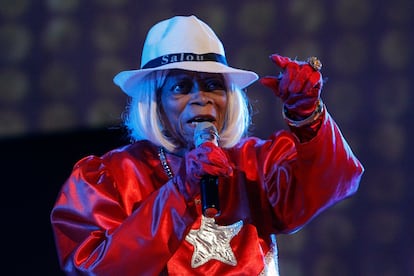How diva Juana Bacallao’s outspoken manner made the Cuban regime uncomfortable
The singer, who died last February, is key to understanding the island’s past, present and future

Juana Bacallao was a Black woman who spent her childhood as an orphan in an Oblate nuns’ school. Later, as a young woman, she cleaned for a living until Obdulio Morales, a renowned composer, heard her sing while she worked on the staircase of a building located between the Laguna and Perseverancia streets in Havana. Morales invited her to audition for a project called El milagro de Oshún. And so, with no formal musical training, she became a diva who starred in cabarets, on television, and in cinema and theater.
Her success lay in building a personality, that of an indomitable woman who introduced the gestures, attitudes and language of the underworld into Cuba’s arts scene. Before and after the Revolution in 1959, Juana Bacallao spoke for the Black population, the poor, the unprotected, and the marginalized; those neglected by Cuba’s unbridled capitalism of the 1930s, 1940s and 1950s and its subsequent socialism. Consequently, the social and cultural elites tried to bury what Juana brought to the fore.
Juana Bacallao not only symbolizes Cuban folklore: the choteo — the revelry. Her greatest feat was to expose the reality of Cuba. As a thorn in the side of Fidel Castro when he came to power, she was punished and relegated for more than three decades to the shady world of cabarets. Cuba’s official culture ignored her as a truth too uncomfortable to be under the spotlight. Not only because of what she represented, but also because of her irreverent discourse. Juana Bacallao was sincere and said whatever came to mind, a cardinal sin in Castro’s Cuba.
“Juana was self-made,” she said to the Associated Press in 2010 of herself. It was a definition expressed when the Revolution, astutely, reigned her in by returning her to the official public arena. Throughout the 65 years of Castroism, these frequent acts of rescuing artistic figures who had been culturally ostracized, such as Antón Arrufat, José Lezama Lima, Delfín Prats, can only be recognized as a bid to clean up the intransigent image of the government. And they always follow the same pattern, ending with awards that cynically recognize the artists’ lifelong work as they enter their twilight years. In the case of Juana Bacallao, she received the National Humor Award when she was 94.
A few years before receiving the award, Juana Bacallao coincided with my wife at a party in Havana. On seeing her, my wife approached. They had never met and my wife just wanted to express her admiration. After they greeted one another, Bacallao asked: “Can you bring me a soft drink?” adding, “But make sure it’s not open.” Bacallao wanted to take the soft drink can home.
The struggle that Juana Bacallao was subjected to is the same that Cubans on the island are experiencing today, prompting them to once again take to the streets to demand food and electricity for their homes.
Juana Bacallao died on February 24 at the age of 98. And she leaves the best possible legacy for the construction of Cuba’s future: the courage to think and express herself freely.
Sign up for our weekly newsletter to get more English-language news coverage from EL PAÍS USA Edition
Tu suscripción se está usando en otro dispositivo
¿Quieres añadir otro usuario a tu suscripción?
Si continúas leyendo en este dispositivo, no se podrá leer en el otro.
FlechaTu suscripción se está usando en otro dispositivo y solo puedes acceder a EL PAÍS desde un dispositivo a la vez.
Si quieres compartir tu cuenta, cambia tu suscripción a la modalidad Premium, así podrás añadir otro usuario. Cada uno accederá con su propia cuenta de email, lo que os permitirá personalizar vuestra experiencia en EL PAÍS.
¿Tienes una suscripción de empresa? Accede aquí para contratar más cuentas.
En el caso de no saber quién está usando tu cuenta, te recomendamos cambiar tu contraseña aquí.
Si decides continuar compartiendo tu cuenta, este mensaje se mostrará en tu dispositivo y en el de la otra persona que está usando tu cuenta de forma indefinida, afectando a tu experiencia de lectura. Puedes consultar aquí los términos y condiciones de la suscripción digital.








































